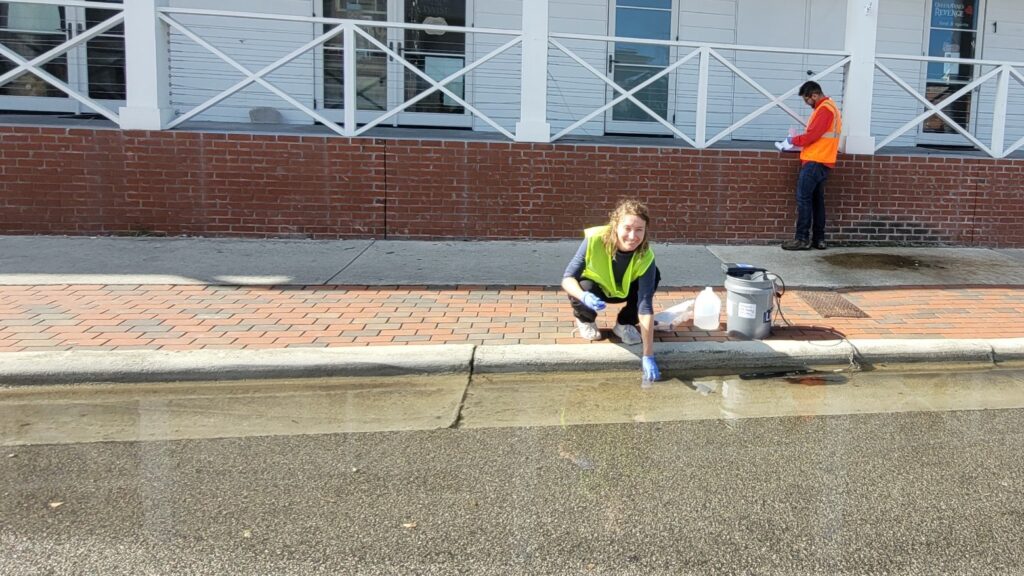Researcher Spotlight – Megan Carr

2023-24 Global Change Research Fellow
PhD Student, Biological and Agricultural Engineering
Advisors: Dr. Natalie Nelson
About You
What do you study?
My PhD research is focused on the dynamics of fecal bacteria contamination at the watershed and municipal-level spatial scales. At the watershed scale, I use remote sensing and machine learning to predict water quality advisories in estuaries where shellfish are grown, while at the municipal-level scale, I conduct fieldwork to assess the effects of chronic tidal floods on coastal water quality and potential exposure to public health.
What (or who) influenced you to go into this field of study?
My research interests are inspired by my love of chemistry. Studying water quality and contamination puts chemistry into an applied context. Contamination shows how humans influence and sometimes disrupt the biogeochemical cycles of our ecosystems.
What do you think is the most pressing issue related to global change?
In my opinion, communication is the most pressing issue related to global change. Though I study how sea-level rise creates novel mechanisms for contamination in our coastal North Carolina communities, there are numerous other researchers studying this same topic in other parts of the US and even in other parts of the world. All of our work is important, and together it shows that climate change is a global problem. Communicating research findings and being able to draw large scale conclusions between different research projects will allow our global population to find solutions to climate change impacts faster.
About Your Research

What is the most important thing that you’ve learned?
The most important thing that I have learned from my research project is teamwork. I could not do this work without the hard work of my advisor, lab mates, and our collaborators, who developed the relationships with the communities we sampled and provided invaluable technical advice and support. Science cannot be done in a vacuum!
Who will benefit from your research?
Coastal communities, particularly those with underground stormwater drainage networks, will benefit from the research our team is conducting.
How would you describe your research to a 3rd grader?
I would describe my research to a 3rd grader by providing the societal context of my research project: Many cities on the coast were built decades before the effects of climate change started occurring. Now, sea level rise affects coastal communities because cities have remained at the same elevation though present day tides are higher than tides from 50 years ago. As a result, underground drainage networks and roadways are regularly flooded. As a researcher, I collect samples of the floodwaters to determine if they are safe for humans.
About Your Global Change Research Fellow Experience
How do you expect the SE CASC Global Change Research Fellows Program to impact you and your work?
The program’s professional development activities support my technical education and experience with formal training in community engagement and outreach. Contamination can be an uncomfortable topic because contaminants are a public health concern that is often burdened unequally. By gaining a diverse cohort of peers through the fellowship, I am learning from and can be a sounding-board for others who have similar motivations to connect their specialty area to broader societal impacts. The fellowship provides a dedicated space for these discussions where we are building community and confidence to share science.
What advice would you give to a student that is interested in getting involved in your field?
My advice to students is to trust their gut and to develop curiosity. Climate change is rapidly unfolding, and we are still learning about the many ways in which climate change will affect communities and ecosystems. If you think something is being impacted by climate change and it doesn’t seem to be widely talked about, don’t be afraid to dive into the topic and inform yourself. Talk to others about it as well. Who knows what you will find out and how it may help others.
What has been the most rewarding part or your favorite part of being a SE CASC Global Change Research Fellow?
The people I have met through this fellowship have been incredible. Thank you for your time and passion.
Learn more about the Southeast Climate Adaptation Science Center’s Global Change Research Fellows program.
- Categories:
